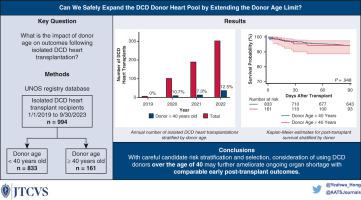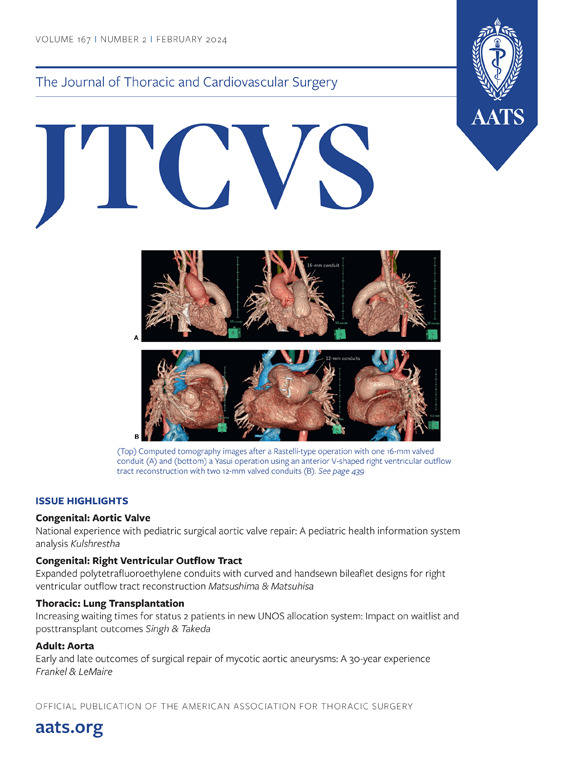我们能否通过延长捐献者年龄限制,安全地扩大循环死亡后捐献者心脏库?
IF 4.9
1区 医学
Q1 CARDIAC & CARDIOVASCULAR SYSTEMS
Journal of Thoracic and Cardiovascular Surgery
Pub Date : 2025-02-01
DOI:10.1016/j.jtcvs.2024.04.008
引用次数: 0
摘要
本文章由计算机程序翻译,如有差异,请以英文原文为准。

Can we safely expand the donation after circulatory death donor heart pool by extending the donor age limit?
Objective
This study evaluates the impact of donor age on outcomes following donation after circulatory death heart transplantation.
Methods
The United Network for Organ Sharing registry was queried to analyze adult recipients who underwent isolated donation after circulatory heart transplantation from January 1, 2019, to September 30, 2023. The cohort was stratified into 2 groups according to donor age, where advanced donor age was defined as 40 years or more. Outcomes were 90-day and 1-year post-transplant survival. Propensity score matching was performed. Subgroup analysis was performed to evaluate the effects of recipient age on 90-day survival among the recipients with advanced-age donors.
Results
A total of 994 recipients were included in the study period, and 161 patients (17.1%) received allografts from advanced-age donors. During the study period, the annual incidence of donation after circulatory heart transplantation with advanced-age donors substantially increased. The recipients with advanced-age donors had similar 90-day and 1-year post-transplant survivals compared with the recipients with younger donors. The comparable 90-day survival persisted in a propensity score–matched comparison. In the subgroup analysis among the recipients with advanced-age donors, the recipients aged 60 years or more had significantly reduced 90-day survival compared with the recipients aged less than 60 years.
Conclusions
The use of appropriately selected donation after circulatory donors aged 40 years or more has similar survival compared with that of younger donors. With careful candidate risk stratification and selection, consideration of using donation after circulatory donors aged more than 40 years may further ameliorate ongoing organ shortage with comparable early post-transplant outcomes.
求助全文
通过发布文献求助,成功后即可免费获取论文全文。
去求助
来源期刊
CiteScore
11.20
自引率
10.00%
发文量
1079
审稿时长
68 days
期刊介绍:
The Journal of Thoracic and Cardiovascular Surgery presents original, peer-reviewed articles on diseases of the heart, great vessels, lungs and thorax with emphasis on surgical interventions. An official publication of The American Association for Thoracic Surgery and The Western Thoracic Surgical Association, the Journal focuses on techniques and developments in acquired cardiac surgery, congenital cardiac repair, thoracic procedures, heart and lung transplantation, mechanical circulatory support and other procedures.

 求助内容:
求助内容: 应助结果提醒方式:
应助结果提醒方式:


